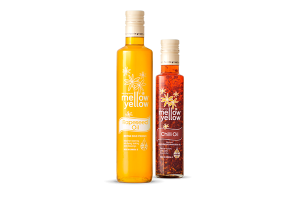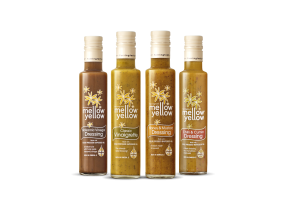Although sugars have been stealing a lot of media coverage recently, it is still important to think about the amount and type of fats in your diet in relation to weight gain and health.
The following article by the British Nutrition Foundation explains why Mellow Yellow is a great source of the ideal type of fat we should be including in our diet.
What is fat?
Fat is a macronutrient (like protein and carbohydrate) and is made up of fatty acids. Fatty acids can be classified as saturated or unsaturated depending on their chemical structure. Unsaturated fatty acids include monounsaturated fatty acids and polyunsaturated fatty acids. All fats provide 9 calories (kcal) per gram, which is more than double the number of calories provided by each gram of protein and carbohydrate that we eat (4 kcal per gram each). A high fat diet can, therefore, lead to weight gain over time.
Why do we need it?
Fat is a good source of energy and we need some of it in our diets to help our bodies to absorb the fat-soluble vitamins A, D, E and K. Within the body, fatty acids form an integral part of our cell membranes, helping to insulate and protect our internal organs, maintaining our body temperature and is involved in lots of body processes such as the development of our brains and the communications which occur between different cells. Cholesterol is needed to produce bile acids, which help us to digest food, and also some of our hormones.
We are able to synthesise most of the specific fatty acids we need apart from two polyunsaturated fatty acids – alpha linolenic acid (an omega 3 polyunsaturated fatty acid) and linoleic acid (an omega 6 polyunsaturated fatty acid). Your body needs these for brain development, growth and for a healthy immune system. They are described as ‘essential fatty acids’ as we need to obtain small amounts from our diet. Alpha-linolenic acid is found in rapeseed, walnut and soya oils and spreads made from these. Linoleic acid is also found in plant-based oils such as sunflower, corn, peanut, rapeseed, olive, safflower, sesame, walnut and soya oil and spreads made from these. Both of the essential fatty acids are present in smaller amounts in foods such as meat, eggs and oily fish.
How much fat should we be eating?
UK dietary guidelines recommend that adults consume no more than 35% of the energy from their foods from fat. This equates to roughly 90g of fat per day for men and 70g for women. Our fat intake in the UK has been falling since the 1960s and, on average, we are now eating around these amounts. While low-fat diets were promoted in previous years, diets containing a moderate amount of fat can be easier to adhere to. So while it is important to try to cut down your total fat consumption, if you are struggling to do this, focus on choosing healthier types of fat.
Saturated fat intake should be restricted to no more than 11% of food energy, which equates to roughly 30g for men and 20g for women, per day. This is because a high intake of saturated fat has been linked to high blood cholesterol, which is a well-known risk factor for heart disease. Aim to replace saturated fat in your diet with small amounts of unsaturated fats by opting for foods rich in unsaturated fats or complex carbohydrates such as wholegrain foods.
Eli Farrington reveals what you might not know about this underused British ingredient
1. A truly versatile all-purpose culinary oil; cold pressed rapeseed oil contains the optimum ratio of 1:2 of omega 3 to omega 6, as well as being a natural source of
vitamin E.
2. It has the lowest saturated fat content of any widely available culinary oil – half that of olive oil!
3. Cold pressing is the traditional and natural way to produce oil. It is gently squeezed out of the seed at temperatures below 40C ensuring that the natural goodness and character of the oil is preserved.
4. The delicate, gentle flavour makes it an ideal partner for almost any food, great for drizzling or dipping.
5. Farrington’s Mellow Yellow emulsifies beautifully making it perfect for dressings, mayonnaise, pesto, and hummus; a healthy complement to starters, salads and vegetables.
6. With a smoke point of 220C, cold pressed rapeseed oil is a wonderful high temperature cooking oil, making the most perfectly golden and crispy roast potatoes, and aromatic, nutty stir-fries.
7. A delicious and healthy substitute for butter and margarine, when you bake with this oil it produces deliciously moist and light cakes that feature a subtle nutty flavour. It’s fabulous used in flapjacks and brownies. When substituting butter with our oil, add a little
less, about 80% of the total weight required and make up the remainder with a liquid such as milk, rice milk or soya milk. This is to account for the milk part and the fat content of the butter. If substituting for margarine, the rapeseed oil content would need to be less, about 75% (with more milk) as there is a higher water content in margarine.
8. As we only use oil from the first pressing of our rapeseed it is the culinary equivalent to extra virgin, cold pressed olive oil.
9. There is no such thing as commercially grown GM rapeseed in Britain.
10. First cultivated in Britain by the Romans; rapeseed oil has been used throughout Europe since the 16th century.

 Oils
Oils Rapeseed Oil
Rapeseed Oil Chili Oil
Chili Oil Dressings
Dressings Classic Vinaigrette
Classic Vinaigrette Balsamic Dressing
Balsamic Dressing Honey & Mustard
Honey & Mustard Chili & Cumin
Chili & Cumin